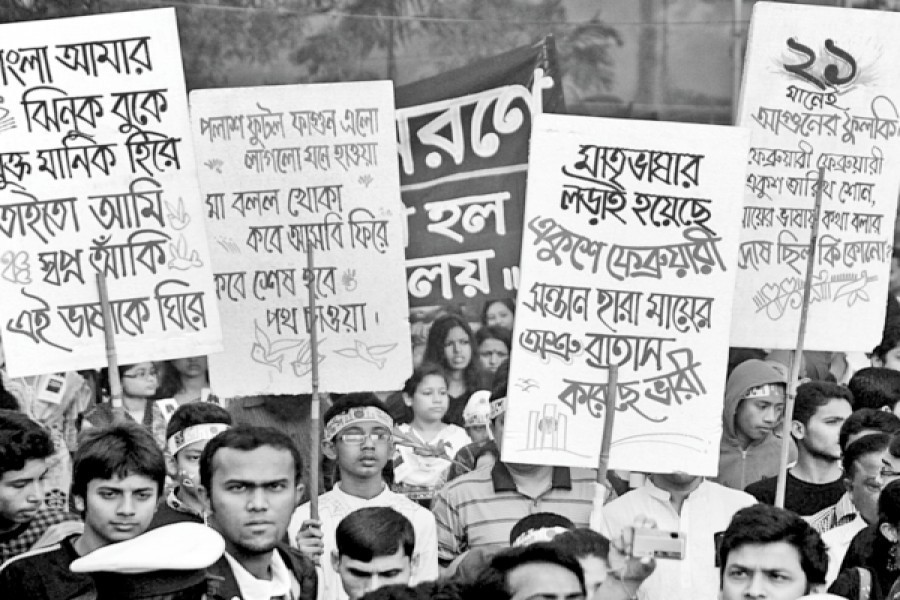Seventy-two years ago this day, students of Dhaka University were staging a demonstration protesting the then-Pakistan government's move to deny Bangla the status of a state language of Pakistan. The police opened fire on the protest marchers. Salam, Barkat, Rafiq, Jabbar and Shafiur were martyred. And the rest is history. The day is ritualistically observed every 21st February. The idea of a secular, Bengali nationalism thus struck root. Unlike in the West where nationalism emerged out of the womb of feudal monarchies through violent socio-economic revolutions in the 19th century, in this part of the world, it remained basically a cultural movement. Actually, it is the leadership of a movement that determines which way it would evolve. The leadership, urban middle class in character, could never wean itself from its feudal roots. As a result, it could not speak for the entire masses.
The urban middle class likes to believe that the independence war of 1971 was the outcome of the struggle they started with the language movement in 1952. But the fact remains that the 1971's liberation war was fought mostly by the members of the peasantry and the working class people. These people joined the war for their social and economic freedom. They believed that they would finally be freed from hunger, the tyranny of the moneylenders, high-handedness of the rural power elite and the oppression of a state that considered them as subjects, not citizens. The urban middle class who mainly comprised the new cultural elite of language-movement-origin, some of whose members joined the war, on the other hand, were busy telling their exploits and imagining that the war was theirs. Like the vast rural masses were never made to feel that they were part of the language movement that took place in Dhaka in 1952, in the post-liberation days, they were again the forgotten lot.
So, what happened to the Bengali language movement and its culmination, Bengali nationalism? Without the masses to own and back it, it reduced mainly to mere cultural or literary events reminiscing the tales of those days gone by. In few cases, it even had begotten chauvinism. And chauvinism of any variety is reactionary, divides people and attempts to claim superiority of one group of people over another. Neither of these developments can help a nation to grow. Though nationalism came to this part of the world rather late, it still had some historical role to play. In the protracted national liberation wars as it happened in the case of the People's Republic of China or in Vietnam in the last century, the nationalistic energies of the entire populations of those nations were fully unleashed. And in the post-liberation phase, the same people put their creative energies into nation building. So, it is not surprising that China is now a global economic superpower and Vietnam, despite the havoc the wars caused to its physical infrastructures and the untold suffering the people of that country went through, it rose like the mythical phoenix from the ashes of the war. So, they are proud nations in their own right. And they never spin out a jeremiad out of their sufferings caused by the war.
Had the masses imbued with nationalistic fervour joined the nation-building task in the post-liberation Bangladesh, in 2023, it could be quite a different story to tell. The idea of Bengali nationhood that the 1952's language movement gave rise to is yet to fulfil its historical mission of uniting the entire nation and taking the struggle that started more than seventy years ago to its next phase. And it is about building an exploitation-free, egalitarian and just society.


